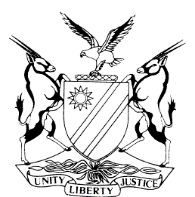REPUBLIC OF NAMIBIA

IN THE HIGH COURT OF NAMIBIA, MAIN DIVISION, WINDHOEK
REVIEW JUDGMENT
PRACTICE DIRECTIVE 61
Case Title: The State v Brandon Pienaar | Case No: CR 70 /2023 | |
High Court MD Review No: 1565/2022 | Division of Court: Main Division | |
Heard before: Judge January et Shivute J | Delivered on: 21 July 2023 | |
Neutral citation: S v Pienaar (CR 70/2023) [2023] NAHCMD 424(21 July 2023) | ||
The order:
| ||
Reasons for order: | ||
January J (Shivute J concurring) [1] The case was submitted from the Keetmanshoop Magistrate’s Court for automatic review pursuant to s 302(1) of the Criminal Procedure Act No. 51 of 1977 (the CPA). [2] The accused was charged with possession of a dependence producing substance in contravention of s 2(b) read with ss 1, 2(i) and 2(iv), 7, 8, 10, 14 and Part I of the schedule of the Abuse of Dependence-producing Substances and Rehabilitation Centres Act No. 41 of 1971 (the Act) to wit: 1 gram of cannabis valued at N$10. [3] The accused pleaded guilty on his first appearance. The prosecutor requested the magistrate to apply s 112(1)(a) of the CPA, to which request the magistrate adhered. The accused was convicted. The public prosecutor proved three previous convictions in relation to the possession of dependence producing substances against the accused. The accused was thereafter sentenced to a fine of N$1000 or in default of payment 3 months’ imprisonment of which N$500 or 46 days are suspended for 4 years on condition that the accused is not convicted of possession of dependence-producing substances committed during the period of suspension. [4] I directed a query to the magistrate in the following terms; ‘1. The magistrate must explain how the disposal of the case in terms of section 112 (1)(a) of the Criminal Procedure Act 51 of 1977 is justified? 2. Does the magistrate consider the possession of a dependence producing substance as a minor offence, irrespective of the quantity and value thereof?’ [5] The magistrate responded as follows; ‘ … Having read the query from the Honourable Reviewing Justice and having re-read the record thereafter, I do concede that finalizing the matter under the auspices of s 112 (1) (a) of Act 51 of 1977 was perhaps not the correct procedure to be adopted. When the magistrate was considering the value and the limit of the fine that can be imposed under the auspices of s 112 (1) (a), the magistrate deemed it appropriate at the time, for a fine exceeding N$6000 would not have been envisaged but with the more experience obtained by the magistrate during his young tenure as magistrate, the magistrate has now come to understand that the practice is not as it ought to be but what it is, in the sense that s 112 (1) (a) is only utilized for trivial offences such as theft but offences relating to dependence producing substances is not considered to be a trivial offence as the case law would dictate, one such case being S v Swartz 2019 (1) NR 197 (HC)…’ [6] The magistrate is correct in his concession. The wording of s 112(1)(a) of the CPA makes it clear that this provision should only be applied in respect of minor offences.1 [7] It is reiterated that, considering the prescribed fine ‘in the case of a first conviction for a contravention of any provision referred to in section 2(b) or (d) of Act 41 of 1971, to a fine not exceeding R20 000 or to imprisonment for a period not exceeding 10 years or to both such fine and such imprisonment’; and the purpose of section 112(1) (a) to dispose of minor offenses expeditiously, the offence cannot be regarded as a minor offence. In addition: 'Where the statutory provision contravened permits a sentence exceeding the limits provided for in s 112(1) (a) the accused cannot be convicted in the absence of questioning or the proof of guilt by evidence.'2 [8] The offence is a serious offence and the sentence provided for in the Act exceeds the limit of s 112(1)(a) CPA. It can consequently never be dealt with under the provisions of section 112(1)(a) of the CPA. What the magistrate did thus amounts to a misdirection. [9] In the result, the following order is made:
| ||
H C JANUARY JUDGE | SHIVUTE J JUDGE | |
1 See: Hiemstra’s Criminal Procedure, Service issue 2, April 2009 by A Kruger, Lexus Nexus at p17-2 to p17-4 and; Commentary on the Criminal Procedure Act.
2 See Lansdown and Campbell South African Criminal Law and Procedure vol V at 412; S v Mkhafu 1978 (1) SA 665 (O) with approval referred to in S v Mostert 1994 NR 83 (HC) and IMPORTANT; S v Onesmus; S v Amukoto;S v Mweshipange 2011 (2) NR 461 (HC).